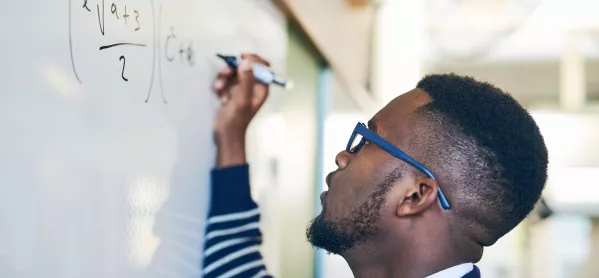Remote teaching has become the new normal for the maths teachers across our trust.
However, the attention of our maths leadership team has already turned to planning our return to classroom teaching. The recent suggestions that there may be a phased reopening of schools from 1 June has only made this more urgent.
One of our biggest concerns is how we will deal with the variation in the maths learning that our students have undertaken during lockdown. In particular, we are thinking about how we might group students who return with varying degrees of lockdown-learning progression.
Maths grouping is a complex issue at the best of times, something that is reflected in the Sutton Trust reports on setting and streaming.
Like most schools, we make use of setting across our trust. This is primarily based on a range of assessment methods, although other factors are also considered. However, it is clear to us that post-lockdown setting practices will need to be flexible.
Coronavirus: What are the options for ability setting when schools reopen?
1. Stick with what you know
One idea is to keep students in the same teaching groups that they were in before we went into lockdown. The obvious problem with this is that some children will have been engaging with their education and will have made progress, while others will have stood still, or even gone backwards.
We have already tried to reduce the impact of this through our choice of lockdown teaching topics - some topics have more impact on future learning than others (compare ratio with loci and construction, for instance) - though the impact of this strategy remains to be seen.
2. Short-term grouping
Another option available to us is to move students between teaching groups or to create short-term teaching groups designed to fill important gaps in knowledge.
This is something that we are likely to make some use of, although it comes with its own challenges, not least our ability to know how successful an individual has been with remote learning.
3. Self-classifying
Right now, children are “self-classifying” based on the amount they are choosing to study and learn. Across our trust, we are seeing engagement vary. In some class groups, we know that at least 70 per cent of the students are attempting the work; in other groups, only 30 per cent are participating.
That’s not a criticism of how the schools or parents have approached home learning. However, it is an acknowledgement that for many students school closure will have had a massive impact on their learning.
Taking the lead from the students when reconsidering ability grouping could be an effective approach.
Coping with a phased return
If the rumours of a phased return are true, having reduced numbers of students in school at any one time may prove an advantage. It may allow for smaller, more focused learning groups designed to level the playing field.
This approach will allow us to increase the degree of individual support and personalisation we are able to provide, which will be key in closing any knowledge gaps. We will also be looking at how we continue to incorporate technology into our strategy.
We already use tools such as Sparx Maths (which is currently available free of charge to schools that have had to close due to Covid-19) to deliver personalised maths learning, and have continued to use the platform to support remote learning during lockdown.
In the face of a phased return, it is very likely that schools will be offering a blend of face-to-face teaching and distance learning, which means the use of technology like this will be essential.
Ultimately, any approach to ability grouping post-lockdown will be a case of trial and error. As with so much in this “new normal”, there are no precedents to follow. But teachers and schools are adaptable. I have no doubt that we will find a way.
